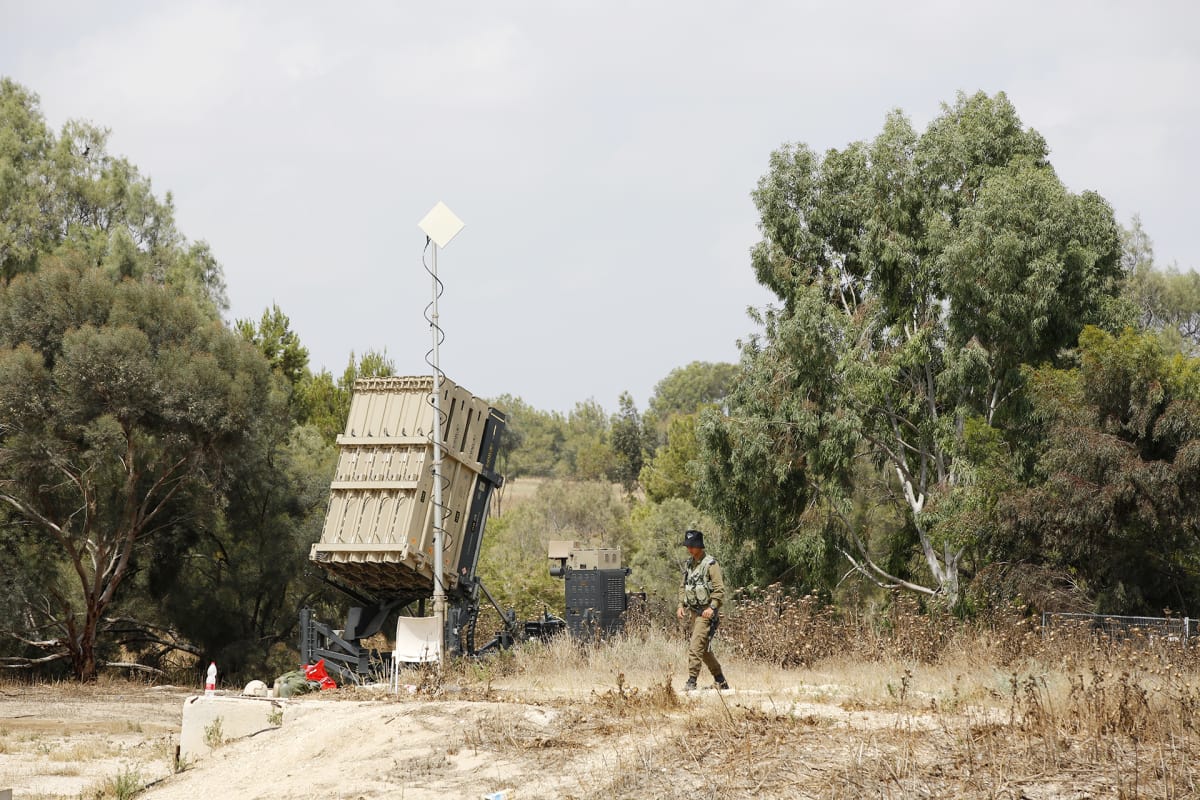IDF is prepared to intensify retaliations at Hamas, but will hold fire if Hamas does too
A spokesperson for the IDF stated that the IDF will ramp up airstrikes and strategic military retaliations in Gaza if rockets continue being shot. A senior defense official stated that, on the other hand, if Hamas holds fire, Israel will too.
May 30, 2018, 3:30PM
Guy Singer
IDF generals in charge of Israel's Southern region and Gaza hold situation assessments regarding the hostilities from Gaza. Photo Credit: IDF Spokesperson.
Over the past 24 hours in Israel, rocket sirens were heard in Israeli cities over 160 times, as Hamas launched rockets, fired mortars, and used machine guns to attack civilians in Southern Israel. The expected tally of projectiles fired from Gaza is close to 200 rockets and mortar shells. In response to this barrage of attacks, the IDF conducted airstrikes of dozens of targets in the Gaza strip that were identified as strategic positions for Hamas and Palestinian Islamic Jihad. Today, as the attacks seemingly slowed to halt, Hamas announced that it was willing to seek a temporary ceasefire with Israel. Mixed responses were given by senior officials in the IDF and Israel’s security apparatus.
The past 24 hours of hostilities between Hamas/PIJ and the IDF have represented the largest exchange of fire since the 2014 Gaza war. As a likely consequence of intense strikes on terrorist positions in Gaza, Hamas announced an alleged ceasefire agreement negotiated by Egypt. Israel’s official spokespeople adamantly denied that any such ceasefire agreement had been reached, but anonymous sources in Israel’s security personnel quietly confirmed that Israel has agreed to hold its fire on Gazan targets so long as Hamas refrains from attacks. As of Wednesday afternoon, Israel time, the supposed ceasefire seems to still be in effect, with a quiet day both in Gaza and Israel. However, the Israeli official emphasized that “if the launches [from Gaza] are renewed, the attacks against Hamas will be intensified.”
Hamas and PIJ echoed the sentiments of Israeli officials, claiming that the two terrorist organization are uninterested in further escalating the hostilities. Mirroring the IDF’s promise to intensify retaliatory strikes if the attacks continue, a PIJ official stated that “you must be stupid to think that we won’t retaliate.”
Minister of Intelligence and Transportation, Israel Katz, was quoted stating that Israel and Gaza are closer to another war than they had been since the 2014 Gaza war. “We don’t want war and neither do they, but we have our red lines,” Katz added.
An intensification in the hostilities would make the current escalation the largest one in a number of years. However, for the time being casualties and injuries remain low on both sides. Israel reported four injuries as a result of the mortar fire from Gaza, with three of the injured being on-duty IDF soldiers. In contrast, the Gaza Health Ministry has yet to report any casualties in Gaza from Israeli airstrikes. In total, the nearly 200 projectiles fired from Gaza were intercepted by the Iron Dome missile defense system or fell in unpopulated areas of Israel. However, in one instance a mortar shell destroyed a house in Israel’s Eshkol region, one shell detonated in a kindergarten, and another fell in a community center in Netivot. In contrast to the civilians targets attacked by Hamas and PIJ, according to the IDF Israel’s shelling in the Gaza strip targeted Hamas terror tunnels, drone facilities, and manufacturing centers for rockets and missiles.
Hamas and PIJ’s cooperation in attacking civilian Israeli targets represents a rare unification of the two terrorist organizations. In releasing a joint statement claiming responsibility for the attacks, the two terrorist groups are seemingly increasing their cooperation in carrying out attacks on Israeli civilians. However, Israel holds Hamas chiefly responsible for any attacks coming out of Gaza, since the political wing of Hamas has held official governing control of Gaza since 2007.
Egypt’s involvement in brokering the ceasefire was reported by Israel’s Hadashot TV news agency, and went on to detail that the country had approached Hamas and PIJ, rather than the other way around. Allegedly, Egyptian officials urged Hamas and PIJ to avoid escalating hostilities further. This development represents the second time in as many months that Egypt has intervened with the intention of curbing hostilities between Gaza and Israel. Earlier in May, Egypt intervened during Hamas’s violent protests along the Israeli border, and were reportedly instrumental in calming down the escalations.




